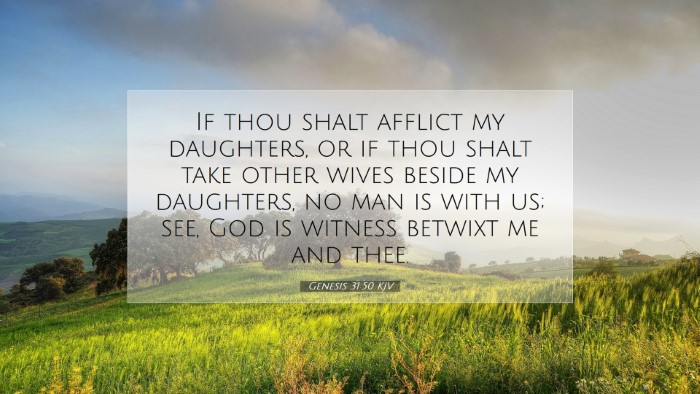Commentary on Genesis 31:50
Genesis 31:50 states: "If you afflict my daughters, or if you take other wives beside my daughters, although no man is with us; see, God is witness between you and me."
Introduction
This verse occurs within a crucial dialogue between Jacob and Laban, marking the end of Jacob's extended sojourn with his father-in-law. It embodies the themes of covenant, witness, and the seriousness of marital fidelity. As we delve into the commentaries of esteemed theologians such as Matthew Henry, Albert Barnes, and Adam Clarke, we can extract profound lessons and insights applicable to contemporary Christian life, emphasizing the significance of faithfulness and divine oversight in human relationships.
Context and Background
The passage arises during the climax of Jacob’s tension-filled relationship with Laban. After years of labor for Laban and the birth of his family, Jacob resolves to leave, taking his wives and children. Laban, though he has blessed Jacob, feels compelled to confront him over several grievances. This moment encapsulates the transition of Jacob from a passive participant in Laban’s schemes to an assertive leader of his own household. It involves not only labor disputes but also questions of familial and marital integrity, which this verse poignantly addresses.
Insights from Matthew Henry
Henry highlights the gravity of Jacob's words, noting that the essence of his covenant with Laban centers on the protection and integrity of his family. This verse reflects Jacob’s protective stance toward his daughters, recognizing the potential for malevolence not just in Laban but in the nature of men who might violate sacred familial bonds. Henry points out that the fear of God is the ultimate witness in human relationships; thus, both Jacob and Laban are reminded that their actions carry divine accountability.
Insights from Albert Barnes
Albert Barnes elaborates on the relational dynamics between Jacob and Laban. He underscores Jacob’s declaration as a solemn oath, invoking God as the witness to their agreement. Barnes comments on the use of the phrase "afflict my daughters," interpreting it as not just physical harm but emotional and spiritual distress that could come from neglect or wrongful actions towards them. Jacob's warning serves as a reminder of the serious consequences of infidelity and the covenant obligations even in familial relationships.
Insights from Adam Clarke
Adam Clarke reflects on the socio-cultural significance of this interaction. He notes that Jacob’s emphasis on the well-being of his daughters indicates the high value placed on women in biblical narrative, despite the patriarchal structure of the society. Clarke emphasizes the weight of Jacob's declaration—acknowledging God's witness indicates a deep understanding of the moral and spiritual dimensions of their covenant relationship. Clarke’s insights remind readers that God observes all interactions, holding individuals accountable for their treatment of each other.
Theological Implications
This verse serves as a rich theological tapestry that intertwines themes of fidelity, family loyalty, and divine observation. It prompts theological reflection on the following:
- Divine Witness: Just as Jacob affirmed God as a witness, modern believers are encouraged to live with the awareness of God’s omnipresence in moral choices.
- Covenantal Relationships: The passage invites reflection on the nature of covenants in relationships, whether familial or marital, highlighting the need for integrity and accountability.
- Women's Rights and Dignity: The protection of Jacob’s daughters affirms the biblical emphasis on the dignity and rights of women, presenting an important dialogue for contemporary discussions on gender equality.
- Responsibility Towards Others: Jacob’s admonition to Laban elevates the discussion of social responsibility, even among kin, encouraging an understanding of mutual respect and care.
Practical Applications
The narrative surrounding Genesis 31:50 invites pastors, students, and theologians to consider practical applications for contemporary life:
- Awareness of our Actions: Recognizing that our actions are observed by God encourages accountability in all our relationships.
- Family Integrity: The protection and care of family members, especially vulnerable ones, should be a priority for believers, fostering environments of love and respect.
- Engaging with Vulnerable Populations: The text challenges the church to advocate for justice and equity for those who may be marginalized or mistreated in society.
- Fostering Healthy Relationships: Believers are called to engage in relationships that honor God's standards, ensuring that our commitments to one another are taken seriously.
Conclusion
Genesis 31:50 not only captures a pivotal moment between Jacob and Laban but also serves as a profound commentary on relational integrity under divine scrutiny. By weaving together insights from respected sources, this examination invites deeper understanding and reflection for pastors, scholars, and students alike, encouraging a commitment to lives marked by faithful witness and integrity in all interactions. The legacy of Jacob’s caution remains relevant today as we navigate the complexities of our relationships in light of God's everlasting witness.


